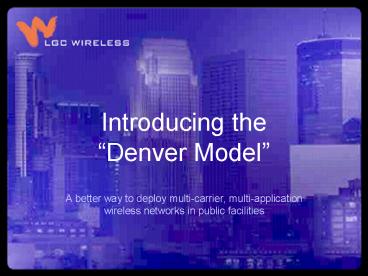Introducing the Denver Model - PowerPoint PPT Presentation
1 / 12
Title:
Introducing the Denver Model
Description:
Market leader in in-building coverage and capacity solutions ... Patriots Stadium, Bradley Center, Alltel Arena, Safeco Field, Busch Stadium sports arenas ... – PowerPoint PPT presentation
Number of Views:70
Avg rating:3.0/5.0
Title: Introducing the Denver Model
1
Introducing the Denver Model
- A better way to deploy multi-carrier,
multi-application wireless networks in public
facilities
2
- Market leader in in-building coverage and
capacity solutions - Installed worldwide, with over 3,000 systems
shipped to over 27 countries - Innovative, patented technology (10 patents
issued 4 pending) - Deploy Cellular, PCS, SMR, iDEN, paging and WiFi
bands - Headquarters in San Jose, CA
- Private company, venture funded
3
LGC the Choice for Public Venues
- JFK, LaGuardia, Newark, Portland, Oakland,
Austin, Love Field, Orlando Sanford, Denver,
Detroit and Palm Beach Airports - Delta Center, Rose Garden, Patriots Stadium,
Bradley Center, Alltel Arena, Safeco Field, Busch
Stadium sports arenas
- 2002 Winter Olympics
- All venues
- LGC was only technology used
- MGM Grand, New York New York, Bellagio, Venetian,
Mirage, Treasure Island, Mandalay Bay and Borgata
Casinos - Anaheim, Richmond and Washington, DC convention
centers
4
Lots of Problems with Wireless Deployment
Projects at Airports
The little carriers have to pay the same lease
as the big carriers
- The lease payment is too high
We only want to cover part of the airport and
youre making us pay a full share of the
equipment cost!
We dont want to share amplifiers and antennas
with another carrier
Can we wait until 2005 to participate in this
project?
The carriers have to provide free WiFi or a
Public Safety system to the airport
The carriers wont pay us what the property is
worth in lease payments
5
Introducing the Denver Model
- Created by DIA IT Management and Pericle
Communications, a Colorado Springs consulting
firm - Allows significant carrier participation in the
selection of the vendor and the design of the
system - Lease payments reflect the amount of capacity a
given carrier is broadcasting into the airport - No intermediary organization to manage the
system(s) once they are deployed
6
DIA background
- Pure coax system installed when airport was built
- Interference problems
- Interference issues, especially for CDMA carriers
- Carriers had moved to outside in coverage from
macro sites - Coverage was spotty in some areas
- Reached capacity limits
- DIA wanted to improve their SMR radio performance
- Required carriers to buy the SMR antenna system
as part of the deal
7
The role of Pericle Communications
- Served as an intermediary and organizer between
the carriers and the airport - Collected and homogenized the technical desires
of the carriers with regard to the antenna system - Wrote an RFP and managed the selection process
- But only the carriers voted on the vendor
selection - Along with the carriers, validated performance of
installed system - Offer RF refereeing service on an on-going basis
8
Benefits of having an Independent Process Manager
(the Pericle Role)
- Handles surge of work associated with the
project, but they leave when the deployment is
finished - Add RF expertise not found in most airport IT
organizations - No additional cost burden beyond deployment
- Ability to independently represent the needs of
all the carriers - Power to make calls on divergence of vision and
create a common ground that is palatable to all
parties
9
Technical Attributes of Denver Project
- Carriers wanted
- Independent antenna systems for each carrier
- Different coverage areas
- Widely varying capacity requirements
- Different design metrics
- Most based on minimum signal strength
- One CDMA carrier wanted a minimum signal to
interference level - Our experience has shown that these requests are
typical for airport projects
10
LGCs Winning Response
- Separate antenna system for each carrier
- Full power of amplifier dedicated to each carrier
means fewer antenna points while delivering high
capacity - Allows for different coverage areas dont pay
for electronics you dont need - Allows for expansion in the future without
renegotiation between carriers - Allows for separation of SMR band and Cellular
band to eliminate interference - Coax free design (CAT5 to antenna points)
- Faster deployment and lower cost
11
Novel Lease Payment Structure
- All carriers had Master Lease Agreements with the
airport (Nine outdoor sites previously deployed) - Leases had a fixed and variable component
- Base lease, per basestation, is the same for all
carriers - Additional fee based on amount of capacity
delivered - Carriers with smaller marketshare pay less, those
with more customers pay more - Allows airport to participate in the success of
the system, without the dreaded per minute
charge
12
Summary of Denver Model Benefits
- High level of cooperation between carriers and
airport - Pericle Communications added significant RF
expertise and created a neutral body that
represented all the carriers, but served the
project first - Independent antenna systems installed in one
project met the varied needs of the carriers - Capacity based lease model allows the airport to
receive full benefit of the opportunity but in
a manner that is equitable to the carriers































